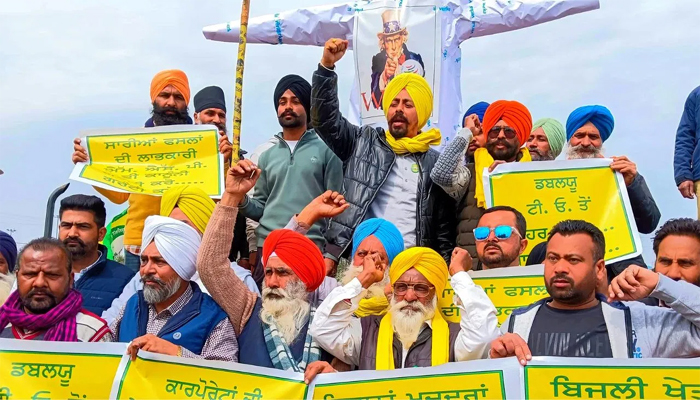New Delhi: As we approach the conclusion of 2024, issues in India have reemerged as farmers voice their demands on the streets for their rights. The demonstrations have caught the attention of Parliament, with the government pledging to address them. During a session in the Rajya Sabha on Friday, Agriculture Minister Shivraj Singh Chouhan emphasized the government’s commitment to offering Minimum Support Price (MSP) to farmers. Actively working on achieving this goal.
Addressing the concerns of farmers has become quite challenging, in reality. Experts highlight factors such as resistance and global treaties that add complexity to the matter. Protesters under the leadership of Samyukta Kisan Morcha (Non) emphasize one request: a legal assurance of Minimum Support Price (MSP) for all agricultural produce based on the Swaminathan Commission’s C2+50% formula incorporating production expenses.
Farmer groups also express worries, such as seeking improved prices for sugarcane and turmeric and requesting exemptions for activities from restrictions related to pollution control measures. Sarwan Singh Pandher, a figure in the demonstrations, expressed, “We have put forward 12 requests to the authorities in the past. While assurances were given, there has been no progress. It seems like the government is no longer attentive to our concerns.”
One of the challenges in establishing a Minimum Support Price (MSP) in India is the country’s obligations to the World Trade Organization (WTO). Farmers are pushing for assured MSPs for all their crops so that the government buys them at rates; however, as a founding member of the WTO, India is restricted by regulations that discourage fixed price mechanisms and prefer subsidies instead.
Introducing the MSP assurance in India might necessitate the country’s withdrawal from the WTO—a move that could have impacts on trade and the economy at large. The strain arising from this situation has sparked protests by farmers against the WTO itself. Underscores the challenge of harmonizing obligations with local needs.
According to Article 246 of the Indian Constitution’s provisions on agriculture as a state subject, this signifies that individual states hold the authority over policies within their respective jurisdictions as stated by the former Union Agriculture Minister Narendra Singh Tomar in Parliament in 2020.
Farmers organizations are pressing for the government to pass a law requiring Minimum Support Price (MSP) implementation despite legal challenges that could arise from such a move, leading to possible conflicts between states and the central government over various issues like law enforcement, as per experts cautionary advice.
An ongoing concern relates to determining the production expenses for establishing the Minimum Support Price (MSP). Certain prominent figures, like Jitu Patwardhan from the Madhya Pradesh Congress, propose that farmers alone should have the authority to determine their expenses in order to align them closely to present conditions.
Farmer organizations are pushing for a revision of the Swaminathan Commission formula to factor in inflation and increased labor expenses, as they claim that labor costs have become a challenge for farmers nowadays, “mentioned one protester, emphasizing the escalating strains they are encountering.
Farmers insist on having a minimum support price (MSP) for all types of crops as a priority issue to address their needs effectively in agricultural practices in India today.
Farmer leader Paramjeet Singh shared his worries about the government’s emphasis on “high-demand crops,” pointing out that essential crops, such as wheat and rice, seem to be overlooked. He questioned the impact this would have for farmers who specialize in cultivating these crops if only a few select crops receive attention.
The protests that continue to unfold serve as an indication of the tensions between farmers and the government that have yet to be resolved completely. Despite more than a year of dialogues following the annulment of the farm laws in question, the trust between the two parties remains delicate. Although the government has restated its commitment to assisting farmers, challenges stemming from legal complexities suggest that a swift resolution is improbable.
The government might need to seek a compromise due to this revived unrest; however, the MSP matter continues to serve as a test for India’s stance on agriculture and governance amidst the involvement of the WTO and complexities in policies and constitutional provisions.
Experts suggest that moving forward involves finding a way to meet the needs of farmers while adhering to regulations and financial constraints outlined in the constitution—an endeavor that calls for ongoing discussions and governmental determination.



Comments are closed.